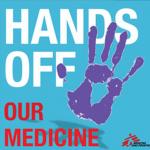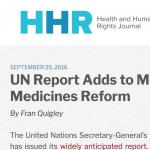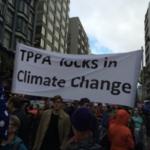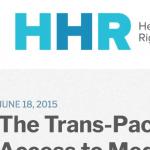In an important new collective statement, top leadership from multiple major faith denominations have strongly reaffirmed their traditions’ recognition of the human right to health, and insisted that trade agreements--including a renegotiated NAFTA--should not include terms that extend medicine monopolies.
PFAM coordinator Fran Quigley was interviewed by poet and editor Katy Giebenhain for the United Lutheran Seminary podcast, "The Seminary Explores."
Recognizing that access to essential medicines is a moral imperative, the mission of People of Faith for Access to Medicines is to achieve medicines availability as a fully-realized human right. Every child who needs a vaccine should receive it, as should every parent who needs cancer medicines. In pursuing that goal, we are following the lead of long faith and moral traditions and well-settled human rights law.
Like everyone else in the U.S. and beyond, access to medicines advocates are trying to figure out just what the impact will be from last week’s surprising election results.
No one knows for sure, but it seems there is some bad news and some good news, and plenty of activism opportunities ahead...
Every faith and moral tradition embraces the principle that no human being should suffer without access to the care they need. For that reason, the faith community’s position on the Trans-Pacific Partnership should be clear: it must be rejected.
In addition to the TPP’s likely harmful impact on workers and our environment, this trade agreement would seriously undermine access to lifesaving medicines. As readers of this blog already know, millions of people in TPP countries, including here in the U.S., already struggle to afford the cost of the medicines they need.
Price-gouging anger about drugs like the EpiPen, plus a promising California ballot initiative, and now a strong UN report on access to medicines. Will it all lead to reform of our broken medicines system?
Full disclosure: initially, I was not very excited about the announcement of the convening of the United Nations Secretary-General’s High-Level Panel on Access to Medicines. Every human rights advocate has learned to approach with restraint the news of yet another august group convening to review a crisis.
Such groups can be counted on to issue a wonderful report with promising language. But, almost inevitably, the gauzy, aspirational recommendations in that report are promptly ignored. Worse, in the case of access to medicines, noble but unenforceable calls for reform are reliably bulldozed over by binding trade agreements that elevate corporate profits over human rights.
The flaws of the modern medicine patent system are widely decried. The current system fails to develop medicines to address the health needs of the global poor and creates a platform for unaffordable pricing of the medicines that exist. But even the harshest critics of the patent paradigm recognize the need to provide incentives for vigorous research and development of new medicines. Many alternatives have been proposed. Some are already in operation at limited levels. But these alternatives are poorly understood, even in the global health community.
Earlier this month, representatives of the Trans-Pacific Partnership Agreement (TPPA) parties announced they had concluded five years of negotiations by agreeing to final terms. The governments have not yet allowed the public to view the agreement, but a version of the TPPA’s intellectual property chapter published by Wikileaks reveals what I consider a potentially devastating setback to the human right to health.
Representatives of Pacific Rim nations are negotiating a trade agreement that could negatively impact the health of millions. But the high-profile discussion about the proposed Trans-Pacific Partnership Agreement (TPPA) also presents an opportunity for health advocates. This Perspective essay first reviews key proposed terms of the TPPA that would extend the flawed pharmaceutical patent regime and violate multiple human rights commitments. Second, the social movement to ensure access to antiretroviral medicines is presented as an object lesson in successful advocacy for health as a human right. Finally, this essay argues that the attention paid to the TPPA by media, lawmakers, and social justice activists, particularly in the US, creates an ideal platform for advocacy in support of the human right to essential medicines.










